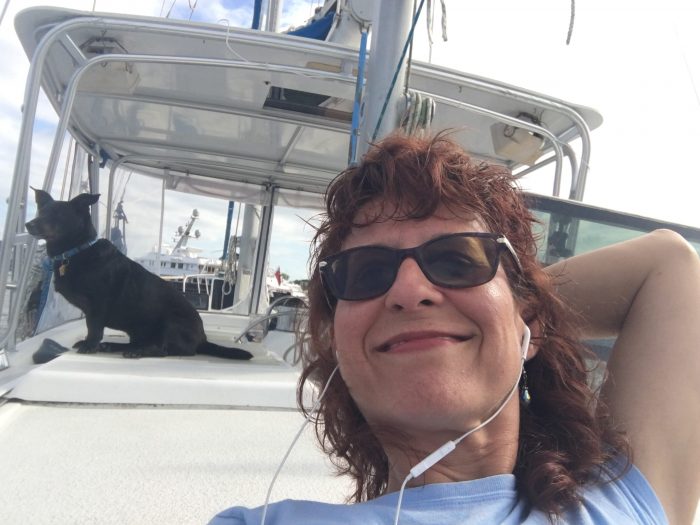I recently moved off our sailboat after living aboard for 20 years.
We survived storms, hurricanes, and enjoyed many adventures on Windsong.
Being greenhorns when we moved aboard, we quickly learned that the ocean could be a beautiful friend and a dangerous adversary. We must adapt, change our ways, and learn to read the signs that nature gives us to avoid any dangers coming at us.
Learning to sail a 20-ton boat has proven to me that I am much stronger than I gave myself credit for, and it has empowered me to step up into my personal and professional life.
Surely, if I can overcome my fears and navigate this foreign element with ease and grace, I can handle isolating at home in a pandemic with the comforts of modern life.
Here are a few things I learned from sailing that comes in handy in our world today:
1. Speed. The nice thing about sailing is that life slows down on the water. Away from the hustling and bustling of our noisy world, our worries and problems drop in the back of the mind, and all that matters is the slow progress of time as our vessel glides on the shiny, blue ocean.
We are faced with only our thoughts and the water, and we appreciate being in the present moment. In a world where everything is moving faster and faster, we should be grateful that we are asked to slow down and enjoy the pause. Many of us speed through life in a race to reach retirement age so that we can slow down.
We have been given a gift of time, so surf the waves, and enjoy the break.
2. Self-sufficiency. When we started sailing, it was before iPhones were popular and precise GPS locations were scrambled by the military. We learned to navigate and rely solely on ourselves to get out of trouble and stay safe and healthy. If anything happened out there, we were alone.
Onboard, we stocked foods and staples to last months. We had extra medicine and hundreds of gallons of water. We made our power, so we did not need to be “on the grid” to have the comforts of electricity. Knowing that we were self-sufficient—and wouldn’t run out of food no matter what—was a comforting feeling.
When a hurricane or a pandemic sends hundreds of people emptying store shelves, sit back and enjoy the foresight of being ready and having a full pantry.
3. Boredom. Sailboats rely on wind to propel them. Some days we fly, and some days we bob away, barely making way and waiting hours for a puff of wind.
When your sails are lull, don’t feel deflated—instead, take the time to do chores you’ve put off for some time. Declutter your environment, clean, and organize so that your living space feels fresh and welcoming.
Don’t forget to declutter your digital world as well—you’ll feel alleviated and ready for when the breeze kicks in.
4. Nutrition. When we were underway, my crew–self-included–often navigated toward the snacks compartment. Most of the time, it was not out of hunger but from an unconscious habit. Sometimes, the motion makes our stomach uneasy, and we reach for food in a reflex to settle digestive issues.
Nervousness can trigger emotional eating, and boredom often leads to overindulging in the wrong kind of foods. Luckily, if you’re on a boat and you haven’t packed it, you can’t run to the store to load up on chips and dips.
Do like sailors and make sure you provision your home with only healthy snacks because if it’s on the shelf, eventually it will find its way into your belly.
Always provision early in the morning after a hearty breakfast—your resolve to do better is always stronger in the morning. So splurge on immune-boosting foods, and feel your best to face any challenge.
5. Loneliness. Sometimes, we were out for days before we saw another living soul. It can get lonely if you’re not used to it. I like to use technology to stay in touch and schedule regular calls with the ones I love.
It’s not because we are far or by ourselves that we have to feel lonely—we can do things that make us feel closer or break the monotony.
If you’re out of range and can’t connect, write letters telling your favorite people how grateful you are to have them in your life. Simply hold on to the letter until your next port of call.
The time spent appreciating your loved ones on paper will uplift your spirit. You can also record voice or fun video messages and send them when in Wi-Fi range. That said, cast away loneliness by finding creative ways to connect with the people you love.
6. Assess the elements. If we resist the elements or sail against the current, we’re in for a wet and bumpy ride. It was scary to face unnamed storms and powerful winds, but we learned to trust our instincts and not let our fears cloud our judgment.
When the elements were against us, we sailed with the wind. It’s better to take advantage of the elements surrounding us and surf through life rather than getting beat-up, picking a fight with mother nature—eventually, she always wins.
Consequently, respect the virus.
7. Maintain your ship. If we don’t take care of our vessel, eventually it would sink. If we avoid fixing small problems, when the time comes when we need our boat to be in top shape to face a hurricane, then our systems could fail, leaving us stranded and in danger simply because we slacked on regular maintenance.
Oftentimes, it’s the little things that snowball into a big problem that sinks your battleship. Proper maintenance—like rest, exercise, and self-care—will ensure you put all odds in favor of your immune system to fight off the virus.
8. Communication. All vessels are equipped with a radio that provides important information. We get hourly updates on the weather and storm systems we may encounter. We stayed ahead of the storms by being prepared and informed, and we avoided sailing into bad weather. We didn’t need to listen to the forecast every second of the day and stress ourselves out. We got accurate information from a reliable source and always knew our surroundings and where we were located on a map.
Get accurate information, avoid hotspots, and don’t fret with the drama.
9. Navigation. It can be scary to enter uncharted territory. It made us a little nervous and sometimes uncomfortable to sail our home into an area we had never been to.
We kept moving ahead, one klick at a time, sometimes threading water and circling around a new anchorage until we found the best place to position ourselves. We chose to embrace the adventure and instead of calling it nervousness, we called it excitement.
Keep looking and moving ahead even if you must crawl—don’t let yourself freeze in fear.
10. Anchor yourself. Being surrounded by the vastness and beauty of nature fills my cup. Discovering new islands, walking a deserted beach, or hiking in the wild connects me with nature and soothes my soul—it gets me out of my worrying mind and into my loving heart.
I have never felt more connected, more grounded, and more alive than when I witnessed the moonrise over 360 degrees of water and sky, under the Milky Way.
Anchor yourself in nature, and let her soothing energies ground your breath.
I hope you enjoyed taking this little journey with me.
Remember that the sun always comes out after the storm.
Treat every day like a big adventure.
Empower yourself with knowledge, and take charge of your own ship because better days lie ahead.
Fair winds and following seas.
~






Read 19 comments and reply